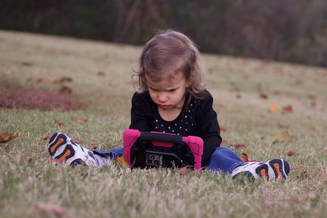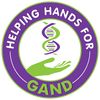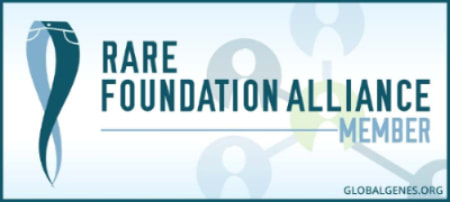Resources
Support
Facebook Support Groups

Helping Hands for GAND - "Like" our page on Facebook to follow updates, news, and articles of interest to the GAND community. Edit your settings for "Posts in News Feed" and "Notifications" (both found as a sub-menu to the "Liked" button) to ensure you don't miss anything. Please "like" and comment on posts to help us boost visibility.
GATAD2B Parent Group - This group is for parents and caregivers of individuals with GATAD2B mutations. We seek to build a community of support and to learn from one another. If asking to join the group, you will receive a message from one of our administrators, so please check both your Facebook inbox and "other" folder.
GATAD2B Community - This group is for family members of individuals with GATAD2B mutations and professionals with an interest in GATAD2B. We seek to build a networking community of support and a better understanding of GATAD2B-associated neurodevelopmental disorder. If asking to join this group, please share the reason for your interest with an administrator.
GATAD2B Parent Group - This group is for parents and caregivers of individuals with GATAD2B mutations. We seek to build a community of support and to learn from one another. If asking to join the group, you will receive a message from one of our administrators, so please check both your Facebook inbox and "other" folder.
GATAD2B Community - This group is for family members of individuals with GATAD2B mutations and professionals with an interest in GATAD2B. We seek to build a networking community of support and a better understanding of GATAD2B-associated neurodevelopmental disorder. If asking to join this group, please share the reason for your interest with an administrator.
Files for Families
We created this folder of various resources for GAND families, including a map, some literature, HHFG links, "About Me" template, and a few published articles.
Research
A current case series clinical study is being conducted by researchers at Cedars-Sinai Medical Center in Los Angeles, California. This study aims to better identify the particular features of GAND. You may contact the lead researcher, Dr. Tyler Pierson, at [email protected].
A collaborative project between Dr. Tyler Pierson of Cedars-Sinai Medical Center and Dr. Juan Young of the University of Miami seeks to use human cellular and mouse models of GAND to further characterize and understand this rare disorder. They also aim to eventually develop methods of screening potential therapeutic compounds that may ameliorate symptoms of GAND. Helping Hands for GAND has awarded $150,000 in research grants to support this important work. With your help, we hope to continue funding this essential project! To learn more, click here.
The Genetic and Rare Diseases Information Center offers tips for undiagnosed patients, including available research programs.
A collaborative project between Dr. Tyler Pierson of Cedars-Sinai Medical Center and Dr. Juan Young of the University of Miami seeks to use human cellular and mouse models of GAND to further characterize and understand this rare disorder. They also aim to eventually develop methods of screening potential therapeutic compounds that may ameliorate symptoms of GAND. Helping Hands for GAND has awarded $150,000 in research grants to support this important work. With your help, we hope to continue funding this essential project! To learn more, click here.
The Genetic and Rare Diseases Information Center offers tips for undiagnosed patients, including available research programs.
Patient Advocacy & Networking
Global Genes is one of the leading rare disease patient advocacy organizations in the world. The non-profit organization promotes the needs of the rare disease community as they seek to build awareness, educate the global community, and provide critical connections and resources that equip advocates to become activists for their disease.
National Organization for Rare Disorders (NORD) is a non-profit patient advocacy organization dedicated to individuals with rare diseases and the organizations that serve them. NORD, along with its more than 280 patient organization members, is committed to the identification, treatment, and cure of rare disorders through programs of education, advocacy, research, and patient services.
Rare & Undiagnosed Network (RUN) is a group of advocates, patients, families, researchers, and healthcare providers who share the same mission and vision to bring genome sequencing into clinical practice to help undiagnosed patients and better understand these conditions as we all work together towards better lives for affected individuals and their families.
National Organization for Rare Disorders (NORD) is a non-profit patient advocacy organization dedicated to individuals with rare diseases and the organizations that serve them. NORD, along with its more than 280 patient organization members, is committed to the identification, treatment, and cure of rare disorders through programs of education, advocacy, research, and patient services.
Rare & Undiagnosed Network (RUN) is a group of advocates, patients, families, researchers, and healthcare providers who share the same mission and vision to bring genome sequencing into clinical practice to help undiagnosed patients and better understand these conditions as we all work together towards better lives for affected individuals and their families.
Augmentative & Alternative Communication (AAC)
Because GAND has a major impact on speech, AAC is highly recommended. Here are a few websites you may find helpful.
PrAACtical AAC
Uncommon Sense blog
Speak for Yourself blog
Speak for Yourself Users Group (open to anyone who uses AAC or is interested in learning more)
The Childhood Apraxia of Speech Association of North America (CASANA)
PrAACtical AAC
Uncommon Sense blog
Speak for Yourself blog
Speak for Yourself Users Group (open to anyone who uses AAC or is interested in learning more)
The Childhood Apraxia of Speech Association of North America (CASANA)

